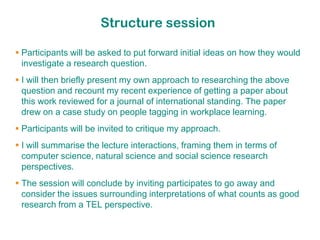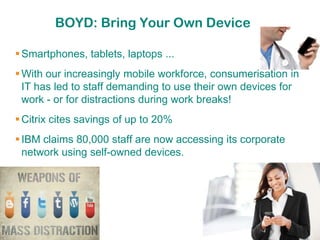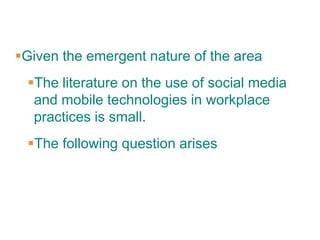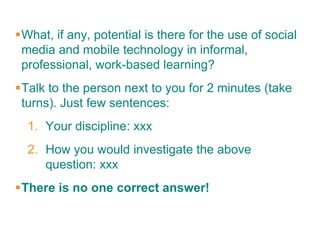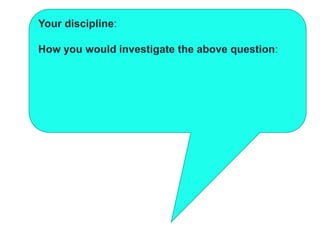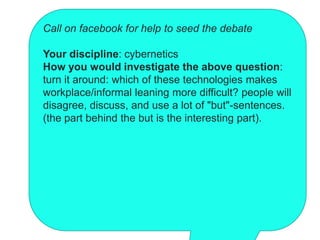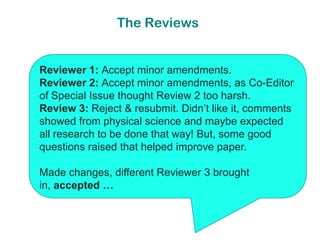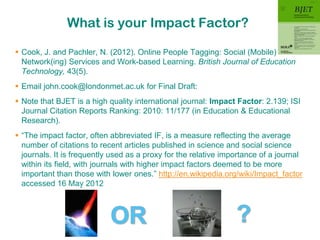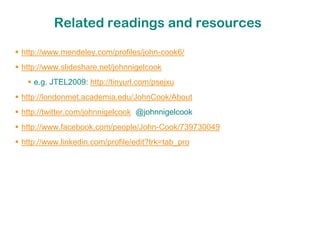#Telss12 interactive lecture social media and mobile technology in informal work based learning
- 1. John Cook Slides: http://www.slideshare.net/johnnigelcook Social Media and Mobile Technologies in Workplace Practices: Interpretations of What Counts as Good Research Technology Enhanced Learning Summer School #telss12 interactive lecture Thursday 24 May, Estoril, Portugal http://www.prolearn-academy.org/Events/summer- school-2012/
- 2. A cautionary tale! Formal & informal learning Health Warning formal learning did this to me
- 3. 7 years later & informal learning saves me!
- 4. Formal learning strikes back and did this& informal learning! 7 years later to me 4 years ago!!
- 5. Reintegrated John? 2 years ago
- 6. Play 5 aside football Rugby union fan LIFE Parent Management PhD students Kids Self taught bass Research player Teaching Formal learning and/or learning in informal John contexts
- 7. Structure session Participants will be asked to put forward initial ideas on how they would investigate a research question. I will then briefly present my own approach to researching the above question and recount my recent experience of getting a paper about this work reviewed for a journal of international standing. The paper drew on a case study on people tagging in workplace learning. Participants will be invited to critique my approach. I will summarise the lecture interactions, framing them in terms of computer science, natural science and social science research perspectives. The session will conclude by inviting participates to go away and consider the issues surrounding interpretations of what counts as good research from a TEL perspective.
- 8. BOYD: Bring Your Own Device Smartphones, tablets, laptops ... With our increasingly mobile workforce, consumerisation in IT has led to staff demanding to use their own devices for work - or for distractions during work breaks! Citrix cites savings of up to 20% IBM claims 80,000 staff are now accessing its corporate network using self-owned devices.
- 9. Given the emergent nature of the area The literature on the use of social media and mobile technologies in workplace practices is small. The following question arises
- 10. What, if any, potential is there for the use of social media and mobile technology in informal, professional, work-based learning? Talk to the person next to you for 2 minutes (take turns). Just few sentences: 1. Your discipline: xxx 2. How you would investigate the above question: xxx There is no one correct answer!
- 11. Your discipline: How you would investigate the above question:
- 12. Call on facebook for help to seed the debate Your discipline: cybernetics How you would investigate the above question: turn it around: which of these technologies makes workplace/informal leaning more difficult? people will disagree, discuss, and use a lot of "but"-sentences. (the part behind the but is the interesting part).
- 13. Call on facebook for help to seed the debate Your discipline: Education How you would investigate the above question: trainee teachers out on placement – interest in the different types of technologies they use/ don't use. Not many tweeters - but this would be a great way for them to keep up-to-date with Government legislation; the policy announcements from the Education Minister- (most weeks something new); to follow debate themes run by Education professors, Michael Rosen is a must, the TES, as well as pulling through fun/interesting/random threads to enliven their day..mobile is clearly the way forward. Full report www.ESCalate.ac.uk/8140
- 14. Call on facebook for help to seed the debate Your discipline: Not given How you would investigate the above question: Read everything I've ever written...Ok this one is best! Toward a mobile Architecture of Participation with Nigel Ecclesfield & added Mike Sharples http://architectureofparticipation.wordpress.com/2010/ 09/10/towards-a-mobile-architecture-of-participation/
- 15. My own approach I will now briefly present my own approach to researching the above question Education-related. The paper drew on a case study on people tagging in workplace learning Recount my recent experience of getting a paper about this work reviewed for a journal of international standing.
- 16. My own approach The paper provides a critical overview of key issues from the literature on work-based learning, face-to-face and technology supported, as well as social (mobile) networking services with particular attention being paid to people tagging. It then introduces an initial typology (checklist) of informal workplace learning in order to provide a frame for understanding social (mobile) network(ing) services in work-based learning. Finally, a case study (taken from the literature) of People Tagging tool use in digital social networks in the European Commission funded MATURE project is used to illustrate aspects of our typology.
- 17. The Reviews Reviewer 1: Accept minor amendments. Reviewer 2: Accept minor amendments, as Co-Editor of Special Issue thought Review 2 too harsh. Review 3: Reject & resubmit. Didn’t like it, comments showed from physical science and maybe expected all research to be done that way! But, some good questions raised that helped improve paper. Made changes, different Reviewer 3 brought in, accepted …
- 18. Participants invited to critique my approach Thoughts …
- 19. What is your Impact Factor? Cook, J. and Pachler, N. (2012). Online People Tagging: Social (Mobile) Network(ing) Services and Work-based Learning. British Journal of Education Technology, 43(5). Email john.cook@londonmet.ac.uk for Final Draft: Note that BJET is a high quality international journal: Impact Factor: 2.139; ISI Journal Citation Reports Ranking: 2010: 11/177 (in Education & Educational Research). “The impact factor, often abbreviated IF, is a measure reflecting the average number of citations to recent articles published in science and social science journals. It is frequently used as a proxy for the relative importance of a journal within its field, with journals with higher impact factors deemed to be more important than those with lower ones.” http://en.wikipedia.org/wiki/Impact_factor accessed 16 May 2012
- 20. I will now summarise the lecture interactions, framing them in terms of research perspectives: • computer science • natural science • social science • Correct me if I got it wrong
- 21. The session now concludes by inviting participates to go away and consider the issues surrounding interpretations of what counts as good research from a TEL perspective. Thank you …
- 22. Related readings and resources http://www.mendeley.com/profiles/john-cook6/ http://www.slideshare.net/johnnigelcook e.g. JTEL2009: http://tinyurl.com/psejxu http://londonmet.academia.edu/JohnCook/About http://twitter.com/johnnigelcook @johnnigelcook http://www.facebook.com/people/John-Cook/739730049 http://www.linkedin.com/profile/edit?trk=tab_pro
Editor's Notes
- Me on left, no me in bright shirt. This is at Strathclyde Uni, Carl Smith found it on Internet …
- BYOD issues. Smartphones, tablets, laptops ... With our increasingly mobile workforce, consumerisation in IT has led to staff demanding to use their own devices for work - or for distractions during work breaks! The benefits for an IT department's budget at first seem tempting, promising dramatically to reduce hardware costs as employees provide their own platforms instead. But the ‘Bring Your Own Device’ phenomenon also brings its challenges in terms of support, management and security. Organisations are being forced to address two key challenges: how to manage secure remote access to essential company resources (like artifacts); and how to control which devices employees are using to access company data (again artifacts). Nevertheless, the movement is growing - Citrix cites [1] savings of up to 20% and IBM [2] claims 80,000 staff are now accessing its corporate network using self-owned devices.http://healthcaretechreview.com/wp-content/uploads/2012/01/smartphone-doctor.jpghttp://www.guardian24.co.uk/Images/Business-Woman-Using-Phone(2).aspxDoes this help? I have done more esoteric research in mobile learning area but will sit on it for now :-)References:[1] Bring-your-own-device projects cut costshttp://www.ft.com/cms/s/0/fd92894c-3658-11e1-a3fa-00144feabdc0.html#axzz1vDvqnd9H[2] IBM CIO discusses Big Blue's BYOD strategy. About 80,000 IBMers are bringing their own devices to workhttp://www.computerworld.com/s/article/9225563/IBM_CIO_discusses_Big_Blue_39_s_BYOD_strategy
- http://sgpropertyadvice.files.wordpress.com/2010/11/impact_pic.jpghttp://www.petergmcdermott.com/wp-content/uploads/2012/03/2006-02-13_Drop-impact.jpg






